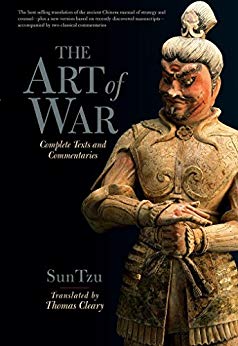

This article is an excerpt from the Shortform summary of "The Art of War" by Sun Tzu. Shortform has the world's best summaries of books you should be reading.
Like this article? Sign up for a free trial here .
What are some of the greatest Sun Tzu quotes on leadership? Are they applicable today, outside the battlefield?
According to Sun Tzu, The leadership describes the acuity and competence of the person charged with leading a fighting force. A good leader should be intelligent, trustworthy, humane, courageous, and stern. When all of these factors are at play, the leader is capable of making sound decisions and can count on the people to support them.
We’ll cover Sun Tzu’s quotes on leadership and expand on what they meant on the battlefield. You’ll find that many of them are just as applicable in everyday life.
A leader leads by example, not by force.
This is one of the most famous Sun Tzu quotes on leadership. A good leader is courageous and strong, so his troops will be, too. Further, a good leader has good troop management.
Troop Management
A good leader takes stock of their troops and determines which are strong and which are weak.
A good leader knows that both rewards and punishments are required. One without the other leads to either a state of complacency or resentment, which negatively affects the troops ability to fight effectively.
A good leader fortifies their troops, ensuring they are fed and healthy, monopolizes on early energy and reserves energy for when it is needed, remains formless and mysterious in defense, and remains patient until the momentum and advantages are in their favor and the enemy shows vulnerability.
When a leader is organized and consistent in leadership, the strong and the weak come together to fight under the same umbrella. When they consider the terrain and take advantage with this combined force, victory is certain.
- When they generate this type of synchronicity in their forces, they can lead them as though they were one person.
When the situation is dire and there is nothing left to lose, a good leader knows they don’t need to mobilize and encourage their forces. Everyone understands the stakes and fights with the same aim voluntarily.
The supreme art of war is to subdue the enemy without fighting.
This has been one of the most influential Sun Tzu quotes on leadership. Victory is not just winning the battle. Killing is not the most important thing. Destabilizing your opponent is. If the battle is won but the opponent’s forces and country are obliterated, that is a lesser victory than if you are able to overcome them and force a surrender.
- If you can weaken your opponent’s resolve and force them to concede with their nation intact, your victory is more successful.
- The people will have greater respect for a battle won with integrity than one won through total destruction.
If you prepare your forces and show your prowess in the five traits, you will have won the psychological battle and may avoid a physical one. If the surrender comes before a battle is fought, all the better. Killing should only be a matter of necessity to survive, not the goal of the mission.
Strike Preemptively to Avoid Battle
The best time to strike an enemy is when they are involved in preparations. Strike before the enemy is fully mobilized, and they will be unable to fight back. This may prevent a battle. This strategy involves using intelligence, rather than brawn, to win. That’s why this is such a widely used Sun Tzu quote on leadership.
If intelligent strategies don’t work, the next strategy is to win through intimidation.
- Form alliances to increase your strength to a point where fighting would be ill-advised for your opponent.
- Form alliances with the enemy’s allies to disrupt the enemy’s power.
Ultimate victory is when battle has been thwarted through intelligence or intimidation, there has been no destruction, no cities have been seized, and no blood has been shed.
Engage people with what they expect.
Using force means allowing the momentum of the conflict to move your hand. A good leader allows momentum, not the brawn of the troops, to provide efficiency of strategy. Let momentum work in your favor, and victory will require little effort. We’ll see that expectations play into the work of momentum, making this an insightful Sun Tzu quote on leadership.
Momentum can be created by manipulating your opponents. Make your opponents follow the path you lay out for them. When they are on your path, you know when and how to attack.
- Assuming a formation to create a false perception of your troops will cause your opponent to take a certain shape, one you’ve manufactured and control.
- Dangle a carrot in front of your opponent by convincing them of manufactured gain, and you will know what their next move will be.
When you force your opponent into action, you can see the ins and outs of their preparedness and strength. You can determine their behavior patterns when you create scenarios where they are forced to act.
Orthodox vs. Unorthodox Action
In battle, fighting is unremarkable. It is straightforward in action. But victory is attained through the remarkable. Unremarkable and remarkable actions are also referred to as orthodox and unorthodox actions, respectively.
Both orthodox and unorthodox actions are taken during conflict. Ensuring victory means having a command of both orthodox and unorthodox actions.
Orthodox actions are straightforward techniques—tried and true behaviors and formations.
- For example, fighting on the front lines or attacking a valuable territory are orthodox actions.
Unorthodox actions are surprise attacks and other maneuvers outside the typical boundaries of battle.
- For example, ambushes and deception are unorthodox tactics.
Orthodox and unorthodox tactics should be blended to work in harmony. Like the endless combination of colors derived from the five primary colors, there are multiple variations encompassed within the primary actions of orthodox and unorthodox behaviors.
- Orthodox behavior is always direct, and unorthodox behavior is always a surprise.
- But the manifestation of each is endless in its possibilities.
Manipulate what your enemy views as orthodox and unorthodox behaviors. This is the essence of this Sun Tzu quote on leadership. By feigning orthodox behavior, you set your opponent up for attack through unorthodox action. For instance, disorganization emerges from organization, fear emerges from bravery, and vulnerability emerges from strength.
- If you want to appear unorganized, you must first be organized.
- If you want to appear cowardly, you must come from a place of courage.
- If you want to appear weak, you must start from a foundation of strength.
- These deceptions will mislead your enemy.
Deception is a great way to gain information about your opponent. If they think you are weak and they attack, you know the level of their aggression and greed.
Be extremely subtle, even to the point of formlessness.
Formlessness has become a goal thanks to this Sun Tzu quote on leadership. When the enemy is forced into action, they must adopt a certain formation. The formation of both your troops and the enemy’s speaks to the psychological conditions of each. Therefore, if the enemy takes a certain form, you can deduce their strengths and weaknesses, using the latter to create a strategy for attack. To avoid allowing the enemy to have this information about your forces, you should remain formless.
Formlessness is a manifestation of defense. When victory is not certain, you should lay low, fortify your position, see to the health of your troops, and appear unorganized. If your troops are unseen, your strategy cannot be known. If your strategy and strength are unknown, the enemy may be lulled into a state of complacency or bravado, both of which lead to careless behaviors.
Treat your men as you would your own beloved sons. And they will follow you into the deepest valley.
This Sun Tzu quote on leadership speaks to the caring but strict role of a competent leader. You should gather your troops only after an assessment of yourself and your enemy has been made and victory is determined the likely outcome. If you gather troops too soon and have to redo the action down the line when you really need them, the public will be weary and less supportive.
However, gathering the troops is not all that is required to build a strong and successful force. Ensuring that the troops are rewarded for their efforts will breed motivation.
- Rewards should be intentional and earned.
- They should be delivered without bias of rank.
Rewards given smartly will encourage the troops to behave in a manner that reaps rewards. On the other hand, rewarding everyone equally or arbitrarily will generate no motivation and deplete your resources.
Likewise, punishments are just as useful as rewards in building the constitution of your force.
Final Thoughts of Sun Tzu on Leadership
Aside from Sun Tzu quotes on leadership, there are many sections in The Art of War that speak to being a good leader.
A good leader is a steward of survival not only for the forces they command, but also for the entire nation. Therefore, if a leader encompasses the qualities of intelligence, trustworthiness, humaneness, courage, and sternness, the nation will be strong. If, however, a leader is lacking in one or more of these qualities, the nation will be weak.
- Leaders must be both loyal and capable.
- They must be able to concoct successful strategies that are unknowable and unpredictable.
- A good leader does what is best for their troops, as well as their nation.
There are five ways of determining which leader will be victorious during a conflict.
- The leader who knows when and when not to engage in battle.
- The leader who understands what sort of manpower is needed and when.
- The leader who has created harmony among the ranks.
- The leader who has prepared a strategy ahead of time.
- The leader who knows when and when not to listen to government commands.
Prowess in Leadership
Victory is formless to outsiders. The public is aware of the win but unaware of how the win manifested. Simply understanding a victory is not the same as having wisdom about how to win. Therefore, a good leader understands the nature of victory in a way laypeople cannot fathom.
Victories of good leaders should not be categorized as brave or cunning. A good leader does not win by luck, accident, or exertion. They use wisdom to win before the battle has even begun.
Keep the formation of victory a secret from the public. Keep the knowledge of the masses focused on the result of victory, not on the tactics of victory. Then your strategies will always be formless.
Similarly, be mysterious even within your own ranks. Keep your troops ignorant of the overall strategy. If they are only aware of your commands, they only have forward-looking vision and can be led like sheep. They know their role is to follow your command and nothing more. The troops are there to carry out the conclusion of the strategy, not help create the strategy.
As well as guarding your strategy from the troops, guard the dangers and disadvantages, as well.
- Do not make them fearful of the tasks ahead.
- Keep them motivated with thoughts of advantage.
- When danger comes upon them, they will voluntarily mobilize to survive.
Ignorance in Leadership
A good leader always takes into account the dangers as well as the advantages when determining action. The mark of defeat is when a leader does not consider advantages and disadvantages. They either rush into battle, react too slowly, are susceptible to emotional disturbances, and fail to conceal strategies. For this leader, defeat is not an occurrence but a consequence.
There are six ways poor leadership leads to defeat.
- Not examining the size of their troops and those of their opponents.
- Not instituting a system of rewards and punishments, or instituting one that is not strictly enforced.
- Poorly training and preparing their troops.
- Having a poor disposition or being easily emotionally distrubed.
- Being unable to command and maintain control of their ranks.
- Not considering the strengths and weaknesses of their troops.
Further Considerations
If a leader does not form alliances, establish authority, and refrain from anger and violence, they will be alone, ineffective, and vulnerable. If a leader can create this situation in their enemy, the enemy will be unable to defend against you.
Follow the advice of Sun Tzu quotes on leadership to be the best leader in your field.
———End of Preview———

Like what you just read? Read the rest of the world's best summary of "The Art of War" at Shortform . Learn the book's critical concepts in 20 minutes or less .
Here's what you'll find in our full The Art of War summary :
- How to mislead your enemies to win the war
- Classic examples from Chinese history to illustrate Sun Tzu's strategies
- How to use spies to gather information and defeat your opponents






